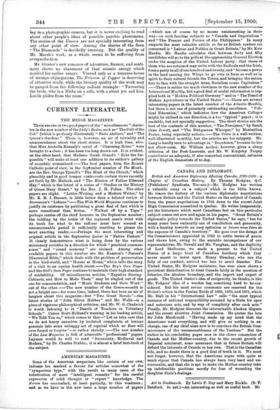CANADA AND DIPLOMACY.
British and American Diplomacy Affecting Canada, 1782-1S99 : a Chapter of Canadian History. By Thomas Hodgins, Q.C. (Publishers' Syndicate, Toronto.)—Mr. Hodgins has written a valuable essay on a subject which is too little known. He traces the history of the various diplomatic negotiations between Britain and the United States on the subject of Canada from the peace negotiations in 1782 down to the recent Joint High Commission assembled in Quebec. He writes temperately, yet the bitterness which most Canadians feel on this particular subject comes out now and again in his pages. "Great Britain's diplomatic policy towards the United States," he says, " has for many years been eminently one of conciliation and generosity, with a leaning towards an easy optimism or laissez nous faire at the expense of Canada's territory." He goes over the doings of the Commissioners appointed in 1782 to settle terms of peace, and shows how, owing to the amiable incompetence of our representatives, Mr. Oswald and Mr. Vaughan, and the duplicity of Lord Shelburne, we made a present to the United States of a large tract of Canadian territory which they never meant to insist upon. Henry Strachey, who saw the folly of our conduct, arrived too late to avert disaster. The United States, Mr. Hodgins maintains, has ever since shown a persistent disinclination to treat Canada fairly in the question of fisheries, the Alaskan boundary, and the import and export of goods. The United States's idea of reciprocity, he thinks, is like Mr. Todgers' idea of a wooden leg, something hard to be con- sidered. But his most severe comments are reserved for the Stntes's action in the Fenian Raids of 1866, 1570, and 1871, which Mr. Hall in his " International Law " calls " the most typical instance of national responsibility assumed by a State for open and notorious acts, and by way of complicity after such acts," Finally, Mr. Hodgins discusses the interminable Alaskan dispute and the recent abortive Joint Commission. He quotes the late Sir John Macdonald : "Having made up my mind that the Americans want everything, and will give us nothing in ex- change, one of my. chief aims now is to convince the British Com- missioners of the unreasonableness of the Yankees." But the author in his concluding pages sees in the closer connection of Canada and the Mother-country, due to the recent growth of Imperial sentiment, some assurance that in future Britain will defend the interests of Canada as her own. That is the Canadian side, and no doubt there is a good deal of truth in it. We must not forget, however, that the Americans argue with quite as much vigour that Canada has always been very hard and un- reasonable, and that she is apt to make the Mother•country take up indefensible positions merely for fear of wounding the daughter State's feelings.






































 Previous page
Previous page